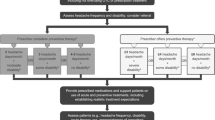Abstract
Medication overuse headache (MOH) most commonly affects people with migraine, particularly in patients who overuse medications intended for short-term pain relief. Education is a very effective treatment option, however, many people need withdrawal support, especially those with psychiatric comorbidities or patients using opioids, barbiturates or benzodiazepines. Many patients also require longer-term migraine preventative medications, such as monoclonal antibodies against calcitonin gene-related peptide, which also show promise as a treatment for MOH.
Similar content being viewed by others
References
Sun-Edelstein C, Rapoport AM, Rattanawong W, et al. The evolution of medication overuse headache: history, pathophysiology and clinical update. CNS Drugs. 2021;35(5):545–65.
Diener HC, Antonaci F, Braschinsky M. European Academy of Neurology guideline on the management of medication-overuse headache. Eur J Neurol. 2020;27(7):1102–16.
Krymchantowski AV, Jevoux CC, Krymchantowski AG, et al. Medication overuse headache: an overview of clinical aspects, mechanisms, and treatments. Expert Rev Neurother. 2020;20(6):591–600.
Kristoffersen ES, Straand J, Vetvik KG, et al. Brief intervention for medication-overuse headache in primary care the BIMOH study: a double-blind pragmatic cluster randomised parallel controlled trial. J Neurol Neurosurg Psychiatry. 2015;86(5):505–12.
Kristoffersen ES, Straand J, Russell MB, et al. Lasting improvement of medication-overuse headache after brief intervention—a long-term follow-up in primary care. Eur J Neurol. 2017;24(7):883–91.
Grande RB, Aaseth K, Benth JS, et al. Reduction in medication-overuse headache after short information. The Akershus study of chronic headache. Eur J Neurol. 2011;18(1):129–37.
Rossi P, Di Lorenzo C, Faroni J, et al. Advice alone vs. structured detoxification programmes for medication overuse headache: a prospective, randomized, open-label trial in transformed migraine patients with low medical needs. Cephalalgia. 2006;26(9):1097–105.
Tassorelli C, Jensen R, Allena M. A consensus protocol for the management of medication-overuse headache: evaluation in a multicentric, multinational study. Cephalalgia. 2014;34(9):645–55.
Zeeberg P, Olesen J, Jensen R. Discontinuation of medication overuse in headache patients: recovery of therapeutic responsiveness. Cephalalgia. 2006;26(10):1192–8.
Roche Laboratories Inc. Toradol (ketorolac tromethamine tablets) presecribing information. 2013. https://www.accessdata.fda.gov/. Accessed 20 Oct 2021.
Hagen K, Albretsen C, Vilming ST. Management of medication overuse headache: 1-year randomized multicentre open-label trial. Cephalalgia. 2009;29(2):221–32.
Hagen K, Stovner LJ. A randomized controlled trial on medication-overuse headache: outcome after 1 and 4 years. Acta Neurol Scand Suppl. 2011;191(191):38–43.
Vernieri F, Pasqualetti P, Paolucci M. Drug withdrawal along with bridge therapy with methylprednisolone and/or diazepam for treatment of medication overuse headache: a preliminary report from the WASH-OUT study. Neurol Sci. 2020;41(Suppl. 2):499–501.
Carlsen LN, Munksgaard SB, Nielsen M. Comparison of 3 treatment strategies for MOH: a randomized clinical trial. JAMA Neurol. 2020;77(9):1069–78.
Aurora SK, Winner P, Freeman MC. Onabotulinumtoxin A for treatment of chronic migraine: pooled analyses of the 56-week PREEMPT clinical program. Headache. 2011;51(9):1358–73.
Pijpers JA, Kies DA, Louter MA, et al. Acute withdrawal and botulinum toxin A in chronic migraine with medication overuse: a double-blind randomized controlled trial. Brain. 2019;142(5):1203–14.
Silberstein SD, Blumenfeld AM, Cady RK. Onabotulinumtoxin A for treatment of chronic migraine: PREEMPT 24-week pooled subgroup analysis of patients who had acute headache medication overuse at baseline. J Neurol Sci. 2013;331(1–2):48–56.
Diener HC, Bussone G, Oene JC. Topiramate reduces headache days in chronic migraine: a randomized, double-blind, placebo-controlled study. Cephalalgia. 2007;27(7):814–23.
Mei D, Ferraro D, Zelano G. Topiramate and triptans revert chronic migraine with medication overuse to episodic migraine. Clin Neuropharmacol. 2006;29(5):269–75.
Silberstein S, Lipton R, Dodick D. Topiramate treatment of chronic migraine: a randomized, placebo- controlled trial of quality of life and other efficacy measures. Headache. 2009;49(8):1153–62.
Sarchielli P, Messina P, Cupini LM, et al. Sodium valproate in migraine without aura and medication overuse headache: a randomized controlled trial. Eur Neuropsychopharmacol. 2014;24(8):1289–97.
Rizzato B, Leone G, Misaggi G, et al. Efficacy and tolerability of pregabalin versus topiramate in the prophylaxis of chronic daily headache with analgesic overuse: an open-label prospective study. Clin Neuropharmacol. 2011;34(2):74–8.
Tepper SJ, Diener HC, Ashina M. Erenumab in chronic migraine with medication overuse. Neurology. 2019;92(20):e2309–20.
Dodick DW, Doty EG, Aurora SK. Medication overuse in a subgroup analysis of phase 3 placebo-controlled studies of galcanezumab in the prevention of episodic and chronic migraine. Cephalalgia. 2020. https://doi.org/10.1177/0333102420966658.
Silberstein S, Cohen JM, Seminerio MJ. The impact of fremanezumab on medication overuse in patients with chronic migraine: subgroup analysis of the HALO CM study. J Headache Pain. 2020;21(1):114.
Chakhava G, Cady R, Kassel E, et al. Consistent reductions in migraine frequency with eptinezumab treatment in patients with migraine stratified by disease characteristics: subgroup analyses of PROMISE-1 and PROMISE-2. [abstract no. A42]. J Headache Pain. 2019;20(Suppl. 1):109.
Diener HC, Marmura MJ, Tepper SJ. Efficacy, tolerability, and safety of eptinezumab in patients with a dual diagnosis of chronic migraine and medication-overuse headache: subgroup analysis of PROMISE-2. Headache. 2021;61(1):125–36.
Sandrini G, Perrotta A, Tassorelli C, et al. Botulinum toxin type-A in the prophylactic treatment of medication-overuse headache: a multicenter, double-blind, randomized, placebo-controlled, parallel group study. J Headache Pain. 2011;12(4):427–33.
Author information
Authors and Affiliations
Corresponding author
Ethics declarations
Funding
The preparation of this review was not supported by any external funding.
Authorship and conflict of interest
C. Fenton, a contracted employee of Adis International Ltd/Springer Nature, and A. Lee, a salaried employee of Adis International Ltd/Springer Nature, declare no relevant conflicts of interest. All authors contributed to the review and are responsible for the article content.
Ethics approval, consent to participate, consent for publication, availability of data and material, code availability
Not applicable.
Rights and permissions
About this article
Cite this article
Fenton, C., Lee, A. Educate patients with medication overuse headache, and intervene, when necessary. Drugs Ther Perspect 37, 573–578 (2021). https://doi.org/10.1007/s40267-021-00878-3
Accepted:
Published:
Issue Date:
DOI: https://doi.org/10.1007/s40267-021-00878-3




